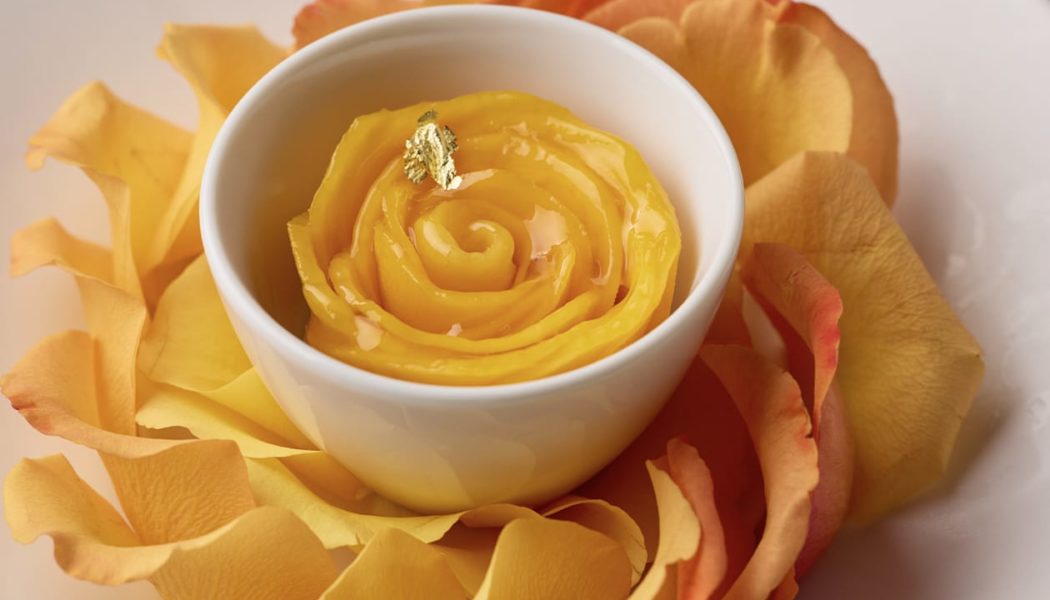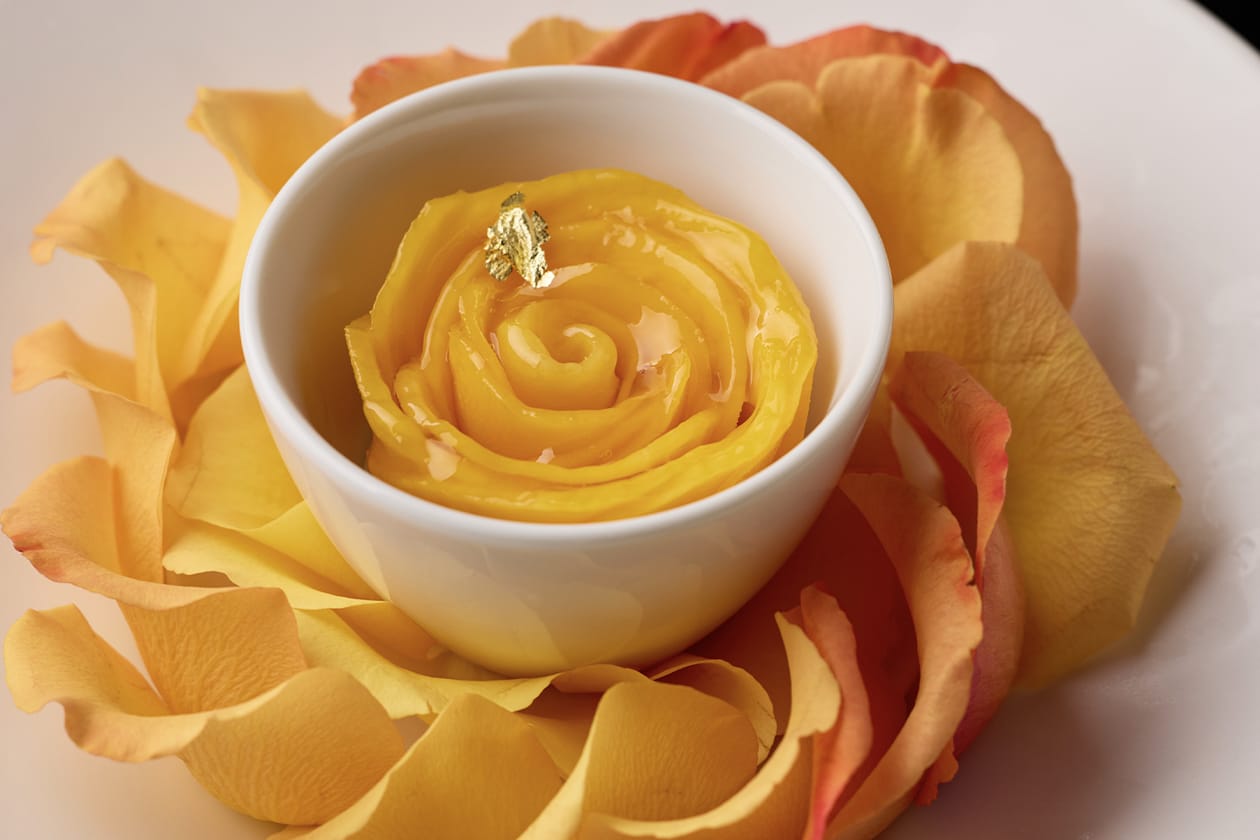Natsuko Shoji celebrated été’s 10th anniversary this year with a three-day exhibition at Kaikai Kiki Gallery in Tokyo that incorporated works from flower artist Makoto Azuma where all the cakes and flowers were given away over the course of the show. The exhibition transformed Takashi Murakami‘s art gallery into a surreal garden, where Shoji’s food art was carefully intertwined with Azuma’s botanical creations. The result was an ethereal garden of edible arrangements that looked way too beautiful to consume, yet that was its purpose and beauty: ephemeral, transient, fleeting.
été today represents both a French fine-dining concept as well as a cake shop. The former is a private restaurant that translates to “summer” in French, and is a reference to “Natsuko” which means “summer child.” The produce is largely local but her ideas are intercontinental; always drawing inspiration from her love for haute couture and art. The esteemed chef marries modern French cooking techniques with her Japanese roots to serve an ever-changing omakase menu that can only accommodate up to six per session. The latter, more precisely, Fleurs d’été, is a cake shop whose beauty is both in its glistening pastries and humble beginnings.
The road to 10 years hasn’t been the easiest one for Shoji. After high school, she worked tirelessly at a restaurant while still staying with her parents. She was so busy with early clock-ins and late clock-outs that she slept on the floor with the lights on to avoid oversleeping. When her father had been hospitalized for a terminal illness, she didn’t notice. He ended up passing away while she was baking a birthday cake for a customer at the restaurant, and this irony of death and life resulted in Shoji’s resignation from the restaurant. She then withdrew from society for a few months and stayed at home to help look after her intellectually challenged sister and widowed mother.
One day, Shoji got a call from an old acquaintance to make desserts for a wedding party — she accepted. Then sweet gig begets sweeter gigs, and soon, she was receiving more and more requests for desserts and even private full-course meals. However, Shoji eventually realized she needed something more stable in order to support her family, so at around 22 years of age, she decided to start her own business.
It wasn’t easy getting a business loan, especially not for a food-related endeavor, and even more so not as a young woman. Shoji ended up using her family’s house as collateral, alongside discreet help from her grandfather, and secured enough money to kick things off. “I didn’t know what the chances of success were, but at the time, it was either success or death,” Shoji recalls. With no track record, she couldn’t yet open the restaurant she wanted, so she started with premium reservation-only cakes — that’s how her signature mango tart was born.
Fleurs d’ été, which translates to “summer flowers,” is a layered masterpiece that artfully lays out fruits on a square base of butter and custard cream. For the mango version, the mangoes, which form the golden roses, are cut into petals and coated with a thin layer of jelly to keep them moist and jewel-like. Shoji pumped out orders of Fleurs d’ été while accepting private chef gigs, and became so overworked that she developed a hernia that needed surgery, which still didn’t stop her from stubbornly sneaking out of the hospital to work on more orders. She continued doing this for another 2–3 years until 2014, when she finally had enough money and quietly opened été.
été started out as an invite-only experience for customers who had bought her tarts, where she only accepted one couple per day to dine in her apartment-restaurant. Her first big break came in 2016, when a television show called “Sma-station” picked up and presented her signature Fleurs d’ été, which aired the same day idol group SMAP broke up and caused her reservation server to crash. Shoji took this time to reset, reassess, and was finally able to hire her first staff member. From this point onwards, things started to fall into right-place-right-time.
Shoji began participating abroad, promoting été on her travels to Bangkok, Taiwan and more. In 2018, the restaurant became fully operational and attracted international guests including the likes of David Beckham who made her realize the importance of social media — and being able to explain the ideas behind her dishes in English. Within that same year, she also met Azuma for the first time, as well as Hong Kong chef Vicky Lau whom she teamed up with for a collaboration dinner. However, with fame comes scrutiny: “People started saying that I was backed by a man who funded me or that I had a rich husband. I began to constantly think about the reason behind why there is a lack of female chefs.”
In 2019, Shoji became successful enough to move her restaurant from a small apartment to a slightly larger location that currently sits a maximum of 6 as aforementioned. Later on in the year, she nervously hosted Takashi Murakami for dinner at été and custom made a cake for him with candy sculptures based on his Flowers, which was so well received that Murakami gave his approval to sell it — Shoji notes it was at this point when her life greatly shifted.
Over the next few years, Shoji went on to win “Best Pastry Chef” in 2020 and “Asia’s Best Female Chef” in 2022 by Asia’s 50 Best Restaurants, achieved the no.1 ranked French cuisine restaurant by Tabelog in 2021, met and worked with many industry leaders including Verdy, Madsaki, Daniel Calvert, as well as brands such as Hermès, Nike, Disney and Kith, and traveled to countless countries from Abu Dhabi to London to Mexico, Cairo, the Maldives and more. “The events abroad were so grueling that I began to cry after each one even though I’m not the crying type,” says Shoji. “It was a year in which I learned that human beings do not grow unless they take on tasks beyond their capacity, and I put my life on the line to do so.”
Today, Shoji still sleeps on the floor, still promotes local ingredients and independent farmers, still challenges stereotypes and continues to fight for her place in the culinary world, as she has done for the last 10 years — except now with a platform as an award-winning pastry chef. “I feel the specialness of été’s 10th anniversary, thanks to the people around me. I aim to transcend and sublimate the value of food as art… and I hope to transmit it to the world, so that the next generation will prosper.”
Find out more about Shoji and été here.










